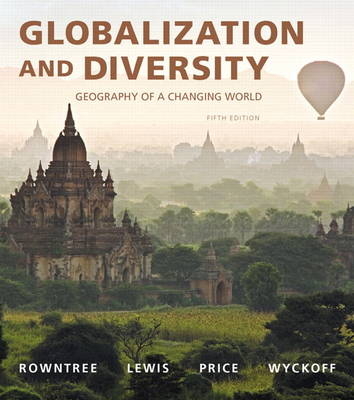
Globalization and Diversity
Pearson (Verlag)
978-0-13-411701-0 (ISBN)
- Titel ist leider vergriffen;
keine Neuauflage - Artikel merken
Helping Readers Understand the Tension Between Globalization and Local Diversity
This contemporary approach to World Regional Geography introduces the latest ideas, concepts, and theories in geography while also developing a strong foundation in the fundamentals of world regions. It conveys a strong sense of place and an understanding of the connections within and between world regions. Globalization and Diversity focuses on the core materials that readers need to know.
The Fifth Edition features new content on everyday globalization, and the tools, skills, and applied approach of contemporary geography, along with MasteringGeographyTM with MapMaster™ NextGen interactive maps, new video resources, animations, and author blogs.
Also Available with MasteringGeography™
This title is available with MasteringGeography–an online homework, tutorial, and assessment program designed to work with this text to engage students and improve results. Within its structured environment, students practice what they learn, test their understanding, and pursue a personalized study plan that helps them better absorb course material and understand difficult concepts.
NOTE: You are purchasing a standalone product; MasteringGeography does not come packaged with this content. If you would like to purchase both the physical text and MasteringGeography search for:
0134075048 / 9780134075044 Globalization and Diversity: Geography of a Changing World Plus MasteringGeography with eText -- Access Card Package, 5/e
Package consists of:
0134117018 / 978013411701 Globalization and Diversity: Geography of a Changing World
0134182731 / 9780134182735 MasteringGeography with Pearson eText -- ValuePack Access Card -- for Globalization and Diversity: Geography of a Changing World
Les Rowntree is a Visiting Scholar at the University of California, Berkeley, where he researches and writes about environmental issues. This career change comes after three decades of teaching both Geography and Environmental Studies at San Jose State University in California. As an environmental geographer, Dr. Rowntree’s interests focus on international environmental issues, biodiversity conservation, and human-caused global change. He sees world regional geography as a way to engage and inform students by giving them the conceptual tools needed to critically assess global issues. Dr. Rowntree has done research in Iceland, Alaska, Morocco, Mexico, Australia, and Europe, as well as in his native California. Current writing projects include a book on the natural history of California’s coast, as well as textbooks in geography and environmental science. Martin Lewis is a Senior Lecturer in History at Stanford University. He has conducted extensive research on environmental geography in the Philippines and on the intellectual history of global geography. His publications include Wagering the Land: Ritual, Capital, and Environmental Degradation in the Cordillera of Northern Luzon, 1900—1986 (1992), and, with Karen Wigen, The Myth of Continents: A Critique of Metageography (1997). Dr. Lewis has traveled extensively in East, South, and Southeast Asia. His current research focuses on the geographical dimensions of globalization. In April 2009, Dr. Lewis was recognized by Time Magazine, as a favorite lecturer. Marie Price is a Professor of Geography and International Affairs at George Washington University. A Latin American specialist, Marie has conducted research in Belize, Mexico, Venezuela, Cuba, and Bolivia. She has also traveled widely throughout Latin America and Sub-Saharan Africa. Her studies have explored human migration, natural resource use, environmental conservation, and regional development. She is a non-resident fellow of the Migration Policy Institute, a non-partisan think tank that focuses on immigration. Dr. Price brings to Globalization and Diversity a special interest in regions as dynamic spatial constructs that are shaped over time through both global and local forces. Her publications include the co-edited book, Migrants to the Metropolis: The Rise of Immigrant Gateway Cities (2008, Syracuse University Press) and numerous academic articles and book chapters. Bill Wyckoff is a geographer in the Department of Earth Sciences at Montana State University specializing in the cultural and historical geography of North America. He has written and co-edited several books on North American settlement geography, including The Developer’s Frontier: The Making of the Western New York Landscape (1988), The Mountainous West: Explorations in Historical Geography (1995) (with Lary M. Dilsaver), Creating Colorado: The Making of a Western American Landscape 1860—1940 (1999), and On the Road Again: Montana’s Changing Landscape (2006), and How to Read The American West (2014). In 2003, he received Montana State’s Cox Family Fund for Excellence Faculty Award for Teaching and Scholarship. A World Regional Geography instructor for 27 years, Dr. Wyckoff emphasizes the connections between the everyday lives of his students and the larger global geographies that surround them and increasingly shape their future.
1. Concepts of World Geography
2. Physical Geography and the Environment
3. North America
4. Latin America
5. The Caribbean
6. Sub-Saharan Africa
7. Southwest Asia and North Africa
8. Europe
9. The Russian Domain
10. Central Asia
11. East Asia
12. South Asia
13. Southeast Asia
14. Australia and Oceania
| Erscheinungsdatum | 24.02.2016 |
|---|---|
| Sprache | englisch |
| Maße | 244 x 276 mm |
| Themenwelt | Naturwissenschaften ► Geowissenschaften ► Geografie / Kartografie |
| ISBN-10 | 0-13-411701-8 / 0134117018 |
| ISBN-13 | 978-0-13-411701-0 / 9780134117010 |
| Zustand | Neuware |
| Informationen gemäß Produktsicherheitsverordnung (GPSR) | |
| Haben Sie eine Frage zum Produkt? |
aus dem Bereich


